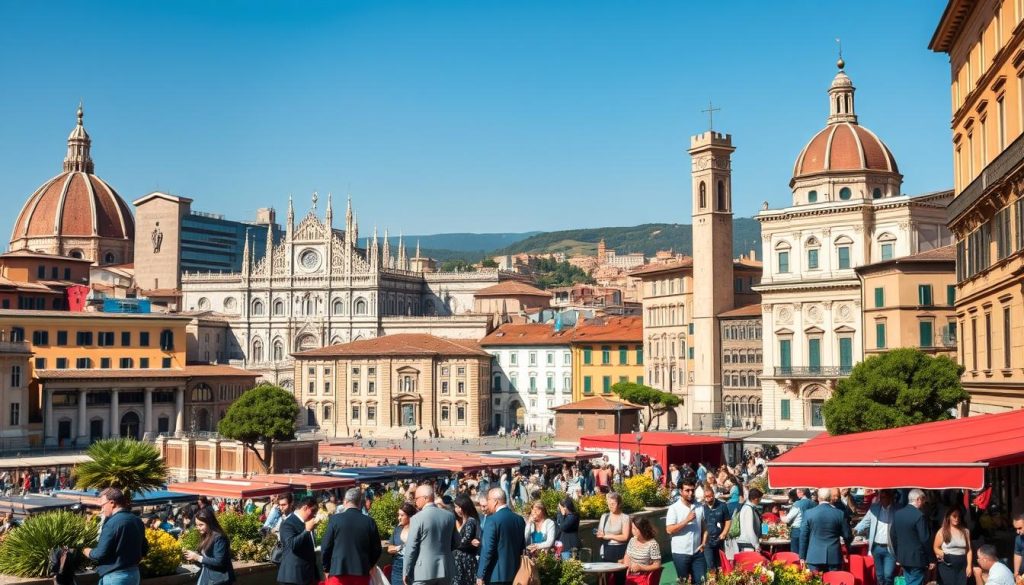Italy’s economy is buzzing with opportunities for entrepreneurs. It’s the third-largest economy in Europe and eighth globally. The country is rich in sectors like life sciences, ICT, fashion, tourism, and luxury real estate.
More people are starting their own businesses, making Italy a hotspot for investors and innovators. You can start a fashion brand in Milan or a boutique hotel in Florence. Italy offers a wide range of business opportunities.
Starting a business is easy, with options like forming an SRL for just 1€. The whole process takes only 5-6 days. This makes it simpler than many think.
Key Takeaways
- Italy’s economy ranks as the third largest in Europe.
- Promising sectors include fashion, tourism, and life sciences.
- Starting a business can require as little as 1€ for forming an SRL.
- The typical incorporation process lasts 5-6 days.
- Italy receives over 94 million tourists annually, contributing to its robust tourism sector.
- Milan is known as Italy’s fashion capital, home to luxury brands.
- Social media is vital for digital marketing success in Italy.
Introduction to Italy’s Business Landscape

Italy’s economy is full of chances for new entrepreneurs. The country’s business scene has grown a lot, with a 17% jump in foreign investment. This brought in €24.1 billion in capital from abroad.
Italy is known for its culture and strong sectors like fashion, tech, and manufacturing. This makes it a great place for starting a business.
Starting a business in Italy comes with costs. Foreign investors might spend between €5,650 in the first year and €1,850 later. This includes fees for registering with the trade register, around €520.
But, Italy has a lot to offer. It has over 155,000 angel investors and 50,000 venture capitalists. This support is key for new businesses. Still, goods and services might cost more here than in other European countries.
The drive to start businesses in Italy is strong. The government helps by supporting business growth. The culture values steady growth over quick changes.
Despite the challenges, Italy welcomes foreign investment. About 88% of its foreign-owned businesses show this openness.
Understanding the Startup Ecosystem in Italy
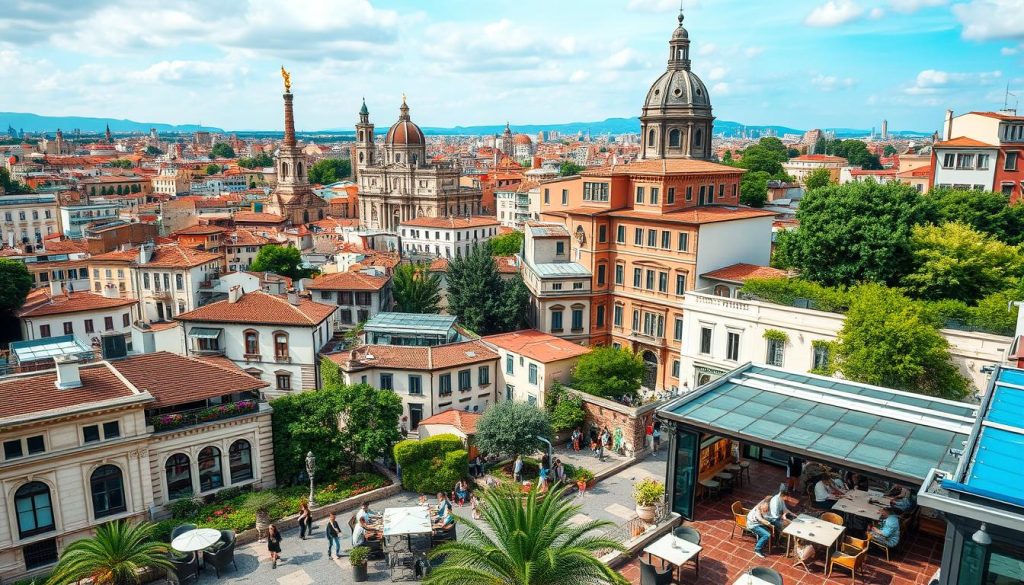
The Italy startup ecosystem is full of life, with many business accelerators, incubators, and co-working spaces. These places are key for new businesses to grow. In 2022, the value of Italian startups jumped to 33 billion Euros, up from 21 billion Euros in 2021. This shows how fast this ecosystem is growing.
Italy is expected to see a big jump in VC funding, with a 64% increase. This is much higher than the 9% decline forecasted for Europe.
By the end of 2021, Italy had 229 incubators and accelerators, a 17-unit increase from the year before. This is great news for entrepreneurs. The government also supports startups with loans of 100,000 to 1.5 million Euros, repayable over five years. This shows the government’s commitment to helping early-stage businesses.
Italy is also home to many innovation hubs, especially in cities that excel in different areas. Milan is a standout, known for fashion, technology, and finance. Cities like Bologna also support tech startups well, thanks to their academic resources and government help. This support shows Italy’s dedication to innovation and entrepreneurial success.
Best Cities in Italy to Start a Business
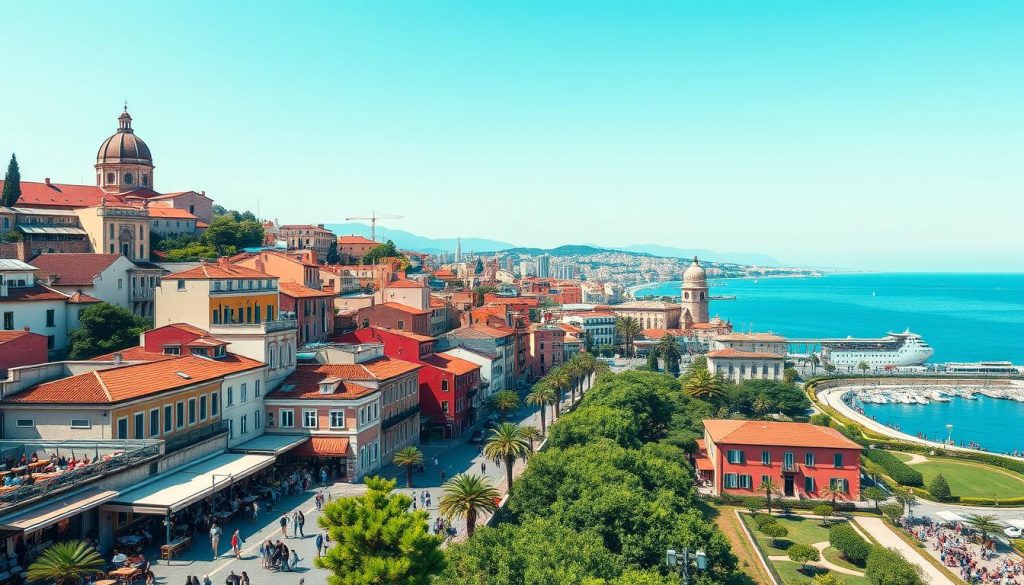
Italy is a great place for entrepreneurs, with many cities perfect for startups. A comparison of Italian startup ecosystems shows each region has its own strengths. Business growth in Italy depends on funding, local support, and active startups.
Comparison of Startup Ecosystems
Cities like Milan, Bologna, and Turin are buzzing with startup activity. Milan has lots of co-working spaces and networking events, helping startups work together. Bologna is known for its strong links with universities, creating new ideas.
Turin is becoming a big player, focusing on cars and tech. It’s attracting investors and talent. Italy is now a top choice for business investment in Europe, making it a key player globally.
Factors Influencing Business Growth
Several things help businesses grow in Italy’s big cities. Government funding, like Smart & Start Italy, is a big help for new businesses. The Italian Startup Visa makes it easier for non-EU innovators to start businesses, needing just a small investment.
Tax breaks for startups also help, making it cheaper to start. Italy’s people have lots of money to spend, creating a great market for new products and services. Knowing these factors for business growth Italy helps entrepreneurs make better choices.
Rome: The Capital of Opportunities
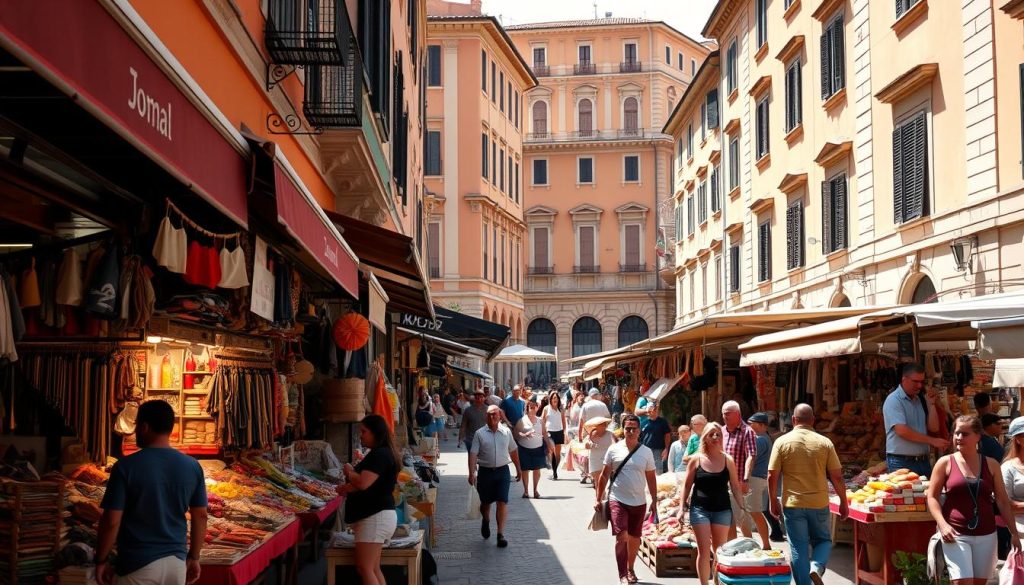
Rome, Italy’s capital, is becoming a key spot for business. It has a rich mix of accelerators like LVenture Group and TIM #WCAP. These groups help startups with advice and money.
Key Accelerators and Incubators
There are many programs to boost innovation and help new businesses grow. These places are important for connecting entrepreneurs with experts and the tools they need to grow.
Industry Focus in Rome
Rome’s industries include tech, healthcare, and creative fields. It’s helped by top universities and research centers. This makes it a great place for startups to grow, both locally and globally.
Rome’s location attracts many skilled people. It also makes it easy to reach markets worldwide. This makes it a great place for starting a business. With a strong network of professionals and institutions, Rome is ready to support your business dreams.
Milano: The Hub of Innovation
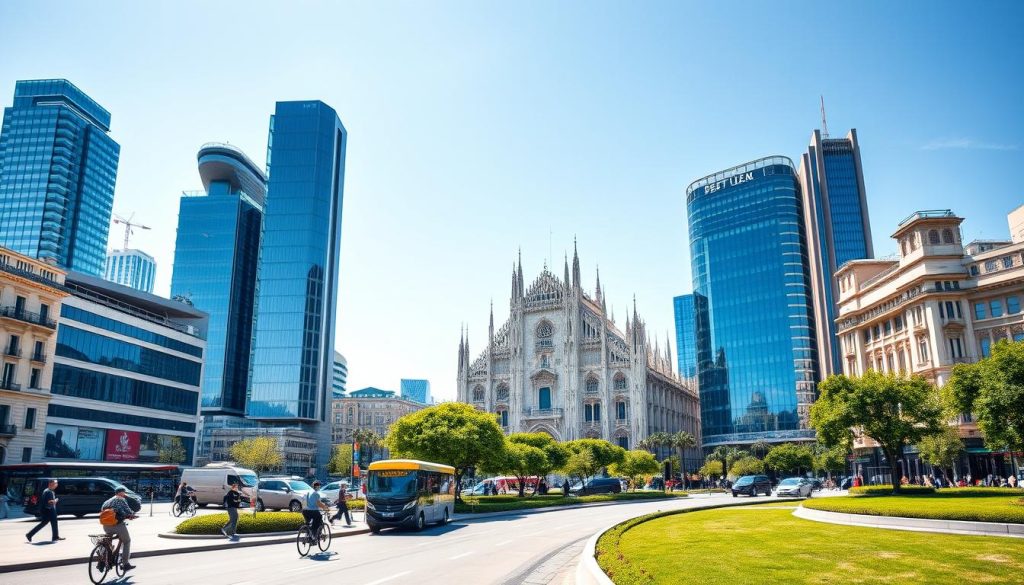
Milan is a key spot for innovation in Italy, especially in finance and tech. It’s a hotbed for startups, adding to the lively Milan startup scene. In 2022, Milan saw over €1.3 billion in startup investments, with fintech and biotech leading the way. By 2023, it had 2,669 startups, making up almost 20% of Italy’s total.
Startup Success Stories
Many startups in Milan show the city’s innovative spirit. AGADE got €14.1 million for smart exoskeleton tech for workers. Babaco Market got €8.1 million to fight food waste with unusual fruits and veggies. Chiron Energy got over €84.5 million for green energy, showing Milan’s fight against climate change.
Financial and Tech Sectors
Milan’s finance scene is strong, with over 13,800 financial firms and half of Italy’s fintech. It’s known as Italy’s fintech capital, with two startups becoming unicorns in 2022. The fintech sector grew from 16 to 630 companies by 2023, showing Milan’s importance in innovation. Contents.com and qomodo raised €24.4 million and €34.5 million, showing tech’s growing investment.
Turin: A Rising Star in Business

Turin is quickly becoming a key place for startups, blending its industrial past with new tech and green ideas. The city’s startup scene is getting a big boost, with Italy’s startups set to get €1.8 billion by 2024, up 20% from last year. The Italian government is also putting in €25 billion for digital and innovation projects through the National Recovery and Resilience Plan.
Several important programs help startups in Turin. Groups like I3P and Techstars Smart Mobility offer valuable help, including money, advice, and connections. This teamwork makes Turin a great place for new businesses to start.
Technology is a big deal in Turin’s business world. For example, Scalapay has teamed up with over 7,000 shops and raised more than $200 million. Casavo is also changing the real estate game, helping over €500 million in deals with prices 15% higher than usual.
Turin is also set to host big events like the Salone dell’Auto di Torino and the Nitto ATP Finals. These events will bring people together and help businesses grow. They show Turin as a lively city where startups can thrive.
In summary, Turin is a smart choice for entrepreneurs. It offers a great place to start a business and take advantage of new chances in a supportive environment.
Florence: Capital of Creativity
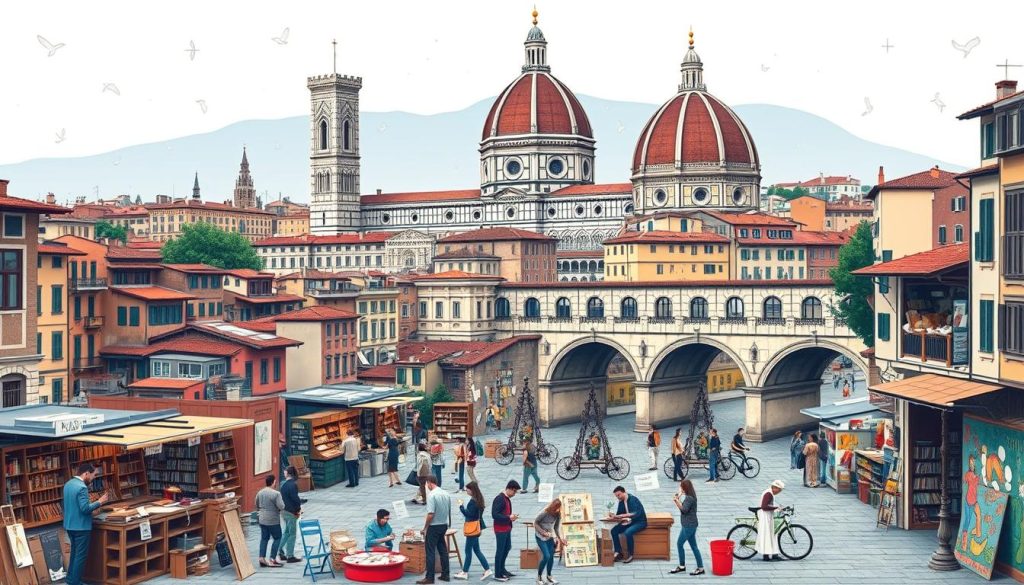
Florence is known for its rich culture and is now a hotspot for entrepreneurship, especially in creative fields. Its ancient buildings and artistic past offer a perfect setting for new businesses. The city’s journey from a medieval town to the Renaissance’s birthplace shows its big role in today’s business world.
Companies face the challenge of keeping up with new tech and methods. Yet, many in Florence are tackling these issues with great determination. They deal with economic, political, and social obstacles head-on.
Emerging Industries
New industries are growing in Florence, thanks to places like Nana Bianca. This place helps mix old traditions with new ideas, letting businesses grow. They keep Florence’s artistic history alive while using the latest tech.
The city is famous for its fashion, design, and food. These areas make Florence a top spot for creative business.
Culture and Lifestyle Benefits
Being in business in Florence offers more than just money. With 380,000 people and over a million in the wider area, there’s a lot of culture to enjoy. Being a UNESCO World Heritage Site and a top creative city makes it even more appealing.
There are also green spaces and ways to travel that are good for the planet. This makes living in Florence great for those who want a good work-life balance. The city’s culture encourages people to work together, leading to more innovation and success in business.
Bologna: The Academic Capital
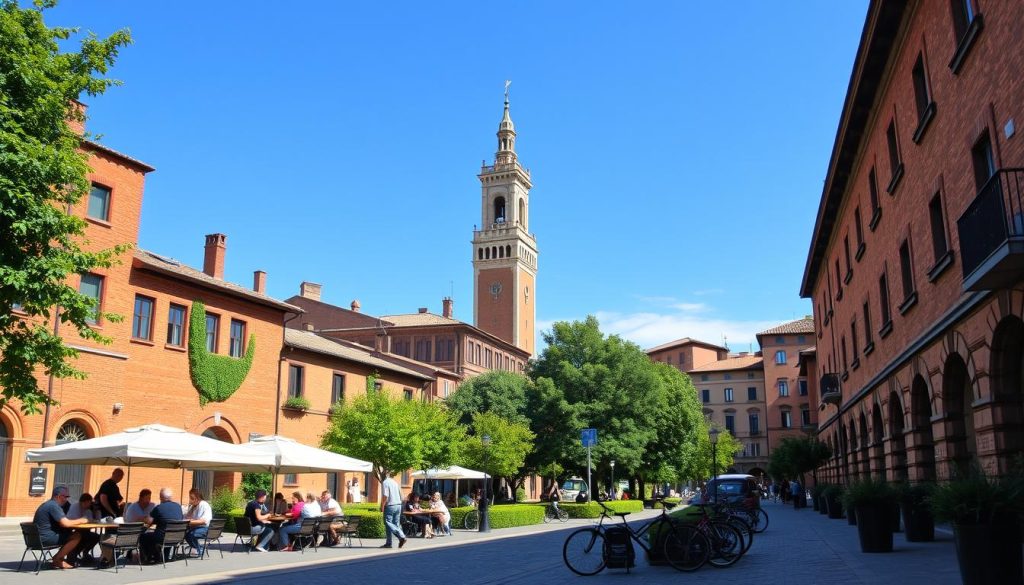
Bologna is a key place for learning and new ideas. It’s famous for the University of Bologna, one of the oldest schools in the world. The city has about 400,000 people and over 1,000,000 in the wider area, making it Italy’s seventh biggest city.
The city’s rich culture and history make it great for startups. It’s helped by partnerships between schools and new businesses.
The city’s dense population of 2,800 people per square kilometre means a wide range of talents. This is crucial for the startup scene. Bologna’s economy is strong, with a GDP of €39.502 billion in 2015. This is thanks to university support for new businesses, especially in food tech and healthcare.
Bologna Business School (BBS) is a key player in education. It has over 300 professors and welcomes 3,500 students from 65 countries each year. Its location and connections with entrepreneurs make it a top place for startups.
Bologna is also focused on making the city better for everyone. It wants to be carbon neutral by 2040 and improve jobs for women. The city works on projects that help both people and businesses, making life and work better for everyone.
Pescara: An Up-and-Coming Business Scene
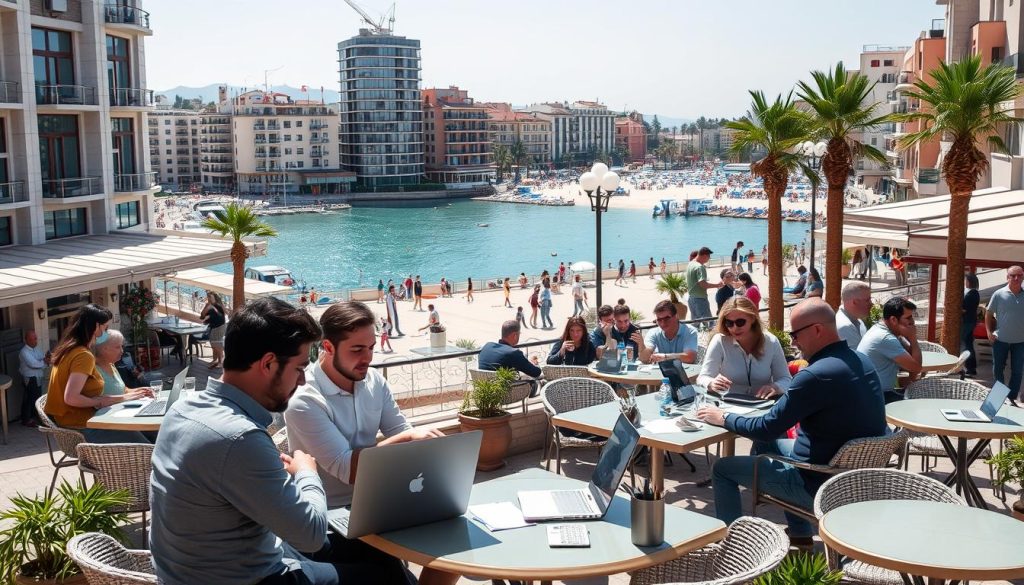
Pescara is becoming a key spot for new businesses. It has a lively atmosphere for entrepreneurs. The city, by the Adriatic Sea, has a lovely climate and stunning views. It’s perfect for those who love warm summers and gentle winters.
With 130 kilometres of coastline, it’s great for tourism and hospitality. The local economy also thrives in agriculture and manufacturing. Even though jobs for non-Italian speakers are scarce, Pescara’s business growth attracts entrepreneurs. Enry’s Island is a big help, offering support and guidance to startups.
Pescara is cheaper to live in than big Italian cities. This makes it easier for startups to start. Housing costs are low, and everyday expenses are affordable. The area also celebrates its culture, with ancient towns and festivals. This makes it a great place for businesses that offer unique experiences.
Naples: A Unique Entrepreneurial Environment
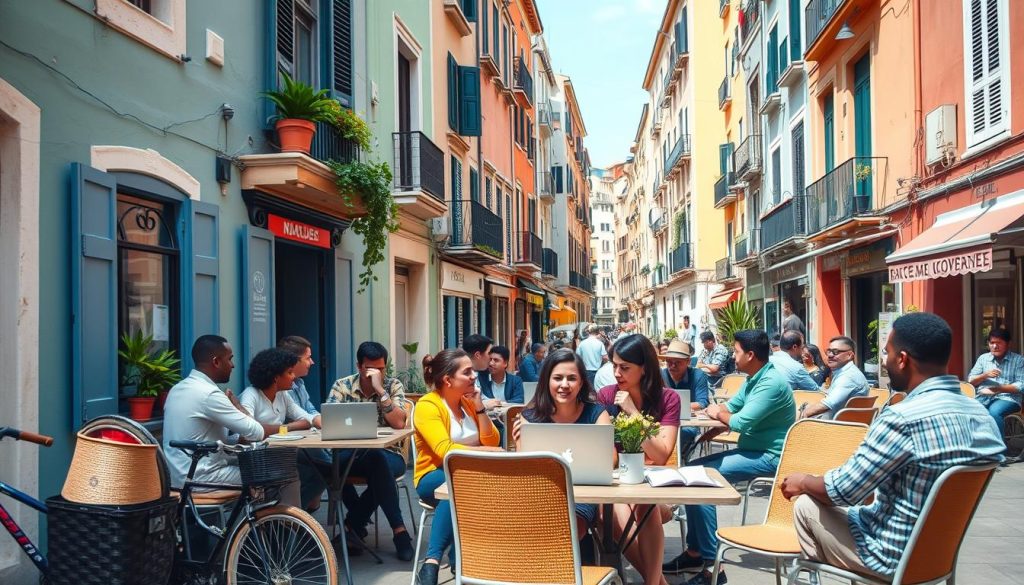
Naples is known for its special entrepreneurial spirit. Here, creativity meets history in a unique way. The startup scene in Naples is booming, especially in tourism, food, and tech. This shows the wide range of Naples business opportunities.
Recently, Naples has seen more tourists. This is thanks to efforts to improve its image and clear up bad stereotypes.
The food and drink industry is growing fast. It’s found that 30% of immigrant entrepreneurs in Italy work in this field. Naples’s rich culture adds to its food scene. It also supports a growing number of ethnic grocery stores, with sales up 10% each year.
There’s a big push for innovation in Naples. This has led to a 15% increase in immigrant-owned businesses over five years. The city has worked hard to make it safer. Now, both tourists and entrepreneurs feel safe to start their businesses.
The import/export business is also doing well, growing by 25% in the last ten years. This is thanks to Naples’s key location. Naples’s entrepreneurial spirit is strong. It’s a great place for businesses looking to thrive.
Trento: A Green Business City
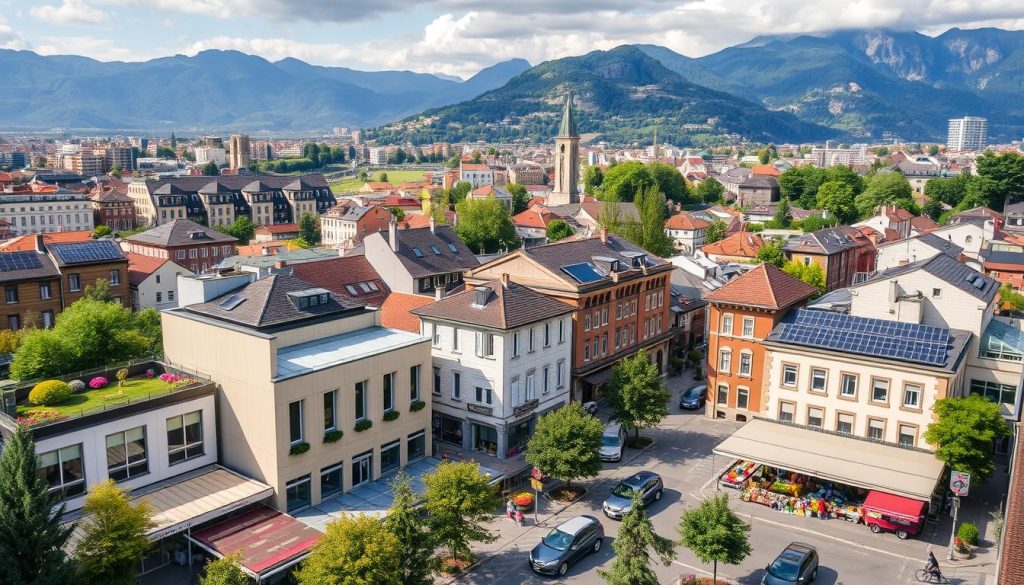
Trento is becoming a key player in the green economy. It attracts entrepreneurs and investors who care about the environment. The city has many startups in fields like agriculture, renewable energy, and technology. They aim to solve big environmental problems with new ideas.
Ecobnb is a great example. It lists over 3,000 places worldwide. Last year, it helped 2.8 million travellers, showing more people want green travel options.
The local government in Trento has set up a board to boost eco-entrepreneurship. They want to find out what makes the region successful and what holds it back. They also want to bring in more skilled workers to help the growing number of businesses, but finding enough workers is a challenge.
The city’s eco-friendly tourism is also growing fast. Byway Travel, for example, saw bookings jump from 173 in 2021 to 2,200 in 2024. This shows more people are choosing sustainable travel. Hotels are now focusing on sustainability, meeting the needs of green-conscious guests and helping the planet.
In short, Trento’s focus on the green economy makes it a great place for startups. It’s a top choice for those interested in eco-entrepreneurship in Italy.
Key Considerations for Entrepreneurs in Italy
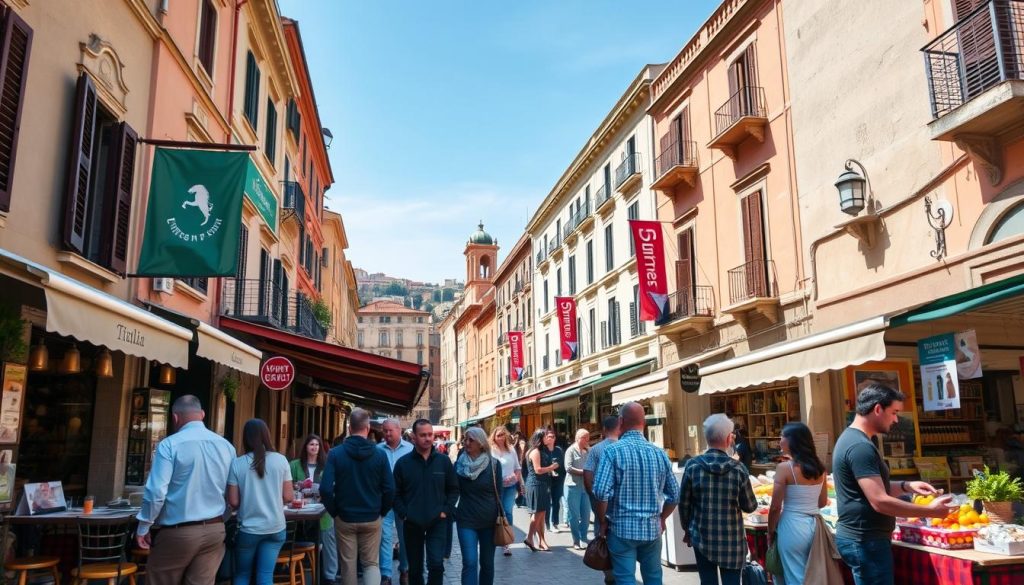
Starting a business in Italy is complex. You need to know the laws and the culture. These things can make or break your business. There are several important areas to focus on.
Legal Requirements
First, you must follow the local laws. You need to register your business and submit documents. This can be expensive, but Italy’s market is competitive and rewarding.
There are ways to get funding. Small banks and credit unions offer loans for new businesses.
Cultural Factors to Consider
In Italy, personal relationships and networking are key. Building trust is crucial for success. Being part of the local community helps a lot.
Italy’s market is diverse and innovative. This shows the need to understand the local business scene. The hospitality and tourism sectors offer both challenges and chances. Being culturally aware is essential for success.
Networking Opportunities in Italian Cities
Networking is key in Italy’s entrepreneurial world. Cities like Milan, Rome, and Florence are hubs for business events. These events help startups and big companies connect. They offer chances for real-time talks and sharing ideas.
These cities also host conferences, workshops, and meet-ups across various industries. Entrepreneurs can show off their ideas and meet investors and mentors. Italy’s big market, thanks to the EU, makes networking even more valuable.
For startups, joining business events in Italy is essential. Whether it’s specific industry meetings or general entrepreneurial events, they’re great for teamwork. By making these connections, you can grow your career and increase your chances of success.

